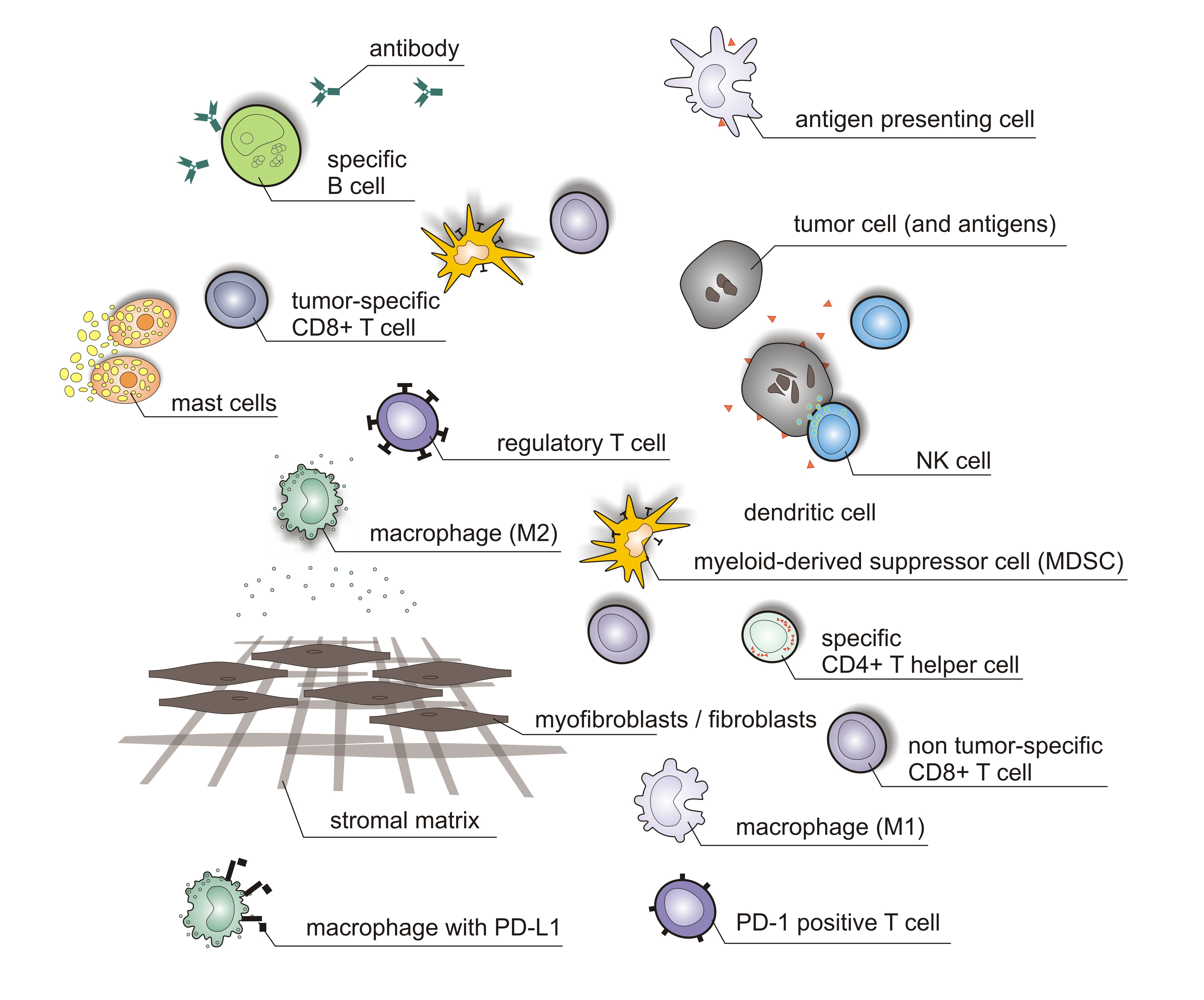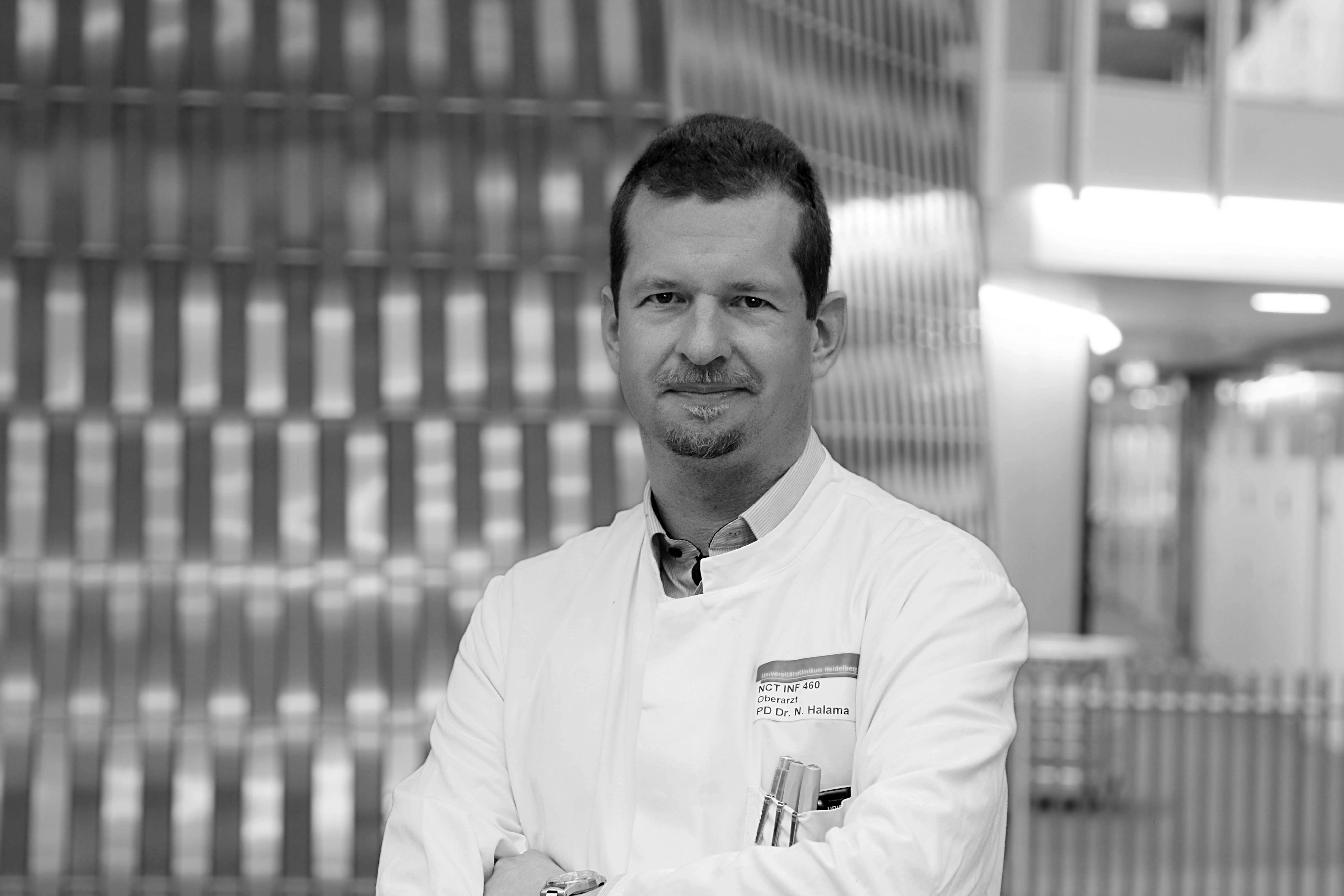Adaptive Immunotherapy
Prof. Dr. Niels Halama
We specialize in solid tumor microenvironments, particularly immune cell interactions. Technologies enable analysis of spatial and functional relationships in limited patient tissue samples. Combined whole tissue scanning, overlay tech, and proteomics offer insights into diverse complexities. Sub-compartment analysis unveils regulatory mechanisms, aiding cancer intervention understanding. Mathematical and computational approaches further enhance heterogeneous dataset analysis. Successful clinical interventions validate this approach, aiming to integrate cellular and modulatory strategies for innovative translational studies.
Research Strategy
The focus of our scientific work so far has been the in-depth analysis and modulation of the solid tumor microenvironment, in particular the complex interactions of cells of the immune system. The developed technologies allow the study of spatial and functional interactions in minimal tissue samples from patients. Whole tissue scanning on slides and virtual overlay technology combined with targeted proteomics create a sophisticated picture of the different complexities in individual patients and cancer entities. Spatial contexture like the specific analysis of sub-compartments (e.g., invasive margin or adipose tissue etc.) further allow to better understand the regulatory mechanisms and their potential for intervention in cancer patients. This is further complemented by research on novel exploratory mathematical or computational approaches to harness the information within the tissue and provide insights for new angles in the analysis of heterogeneous datasets. The translation of these findings into successful clinical interventions and meaningful clinical trials has demonstrated and is demonstrating the validity of this approach. The long-term goal is to integrate differential analyses and an integrated targeted approach (i.e., cellular strategies and modulatory strategies together) into innovative translational studies.

Area of research: Identification of novel treatment approaches for cancer, utilizing systems medicine approaches for rapid translation into clinical trials

Prof. Dr. Niels Halama
- +49 (0)6221 54-51250
- niels.halama@dkfz.de
Selected Publications
More information can be found here
Suarez-Carmona M, Williams A, Schreiber J, Hohmann N, Pruefer U, Krauss J, Jäger D, Frömming A, Beyer D, Eulberg D, Jungelius JU, Baumann M, Mangasarian A, Halama N
J Immunother Cancer. 2021
Wells DK, van Buuren MM, Dang KK, Hubbard-Lucey VM, Sheehan KCF, Campbell KM, Lamb A, Ward JP, Sidney J, Blazquez AB, Rech AJ, Zaretsky JM, Comin-Anduix B, Ng AHC, Chour W, Yu TV, Rizvi H, Chen JM, Manning P, Steiner GM, Doan XC; Tumor Neoantigen Selection Alliance; Merghoub T, Guinney J, Kolom A, Selinsky C, Ribas A, Hellmann MD, Hacohen N, Sette A, Heath JR, Bhardwaj N, Ramsdell F, Schreiber RD, Schumacher TN, Kvistborg P, Defranoux NA
Cell. 2020
CCR5 status and metastatic progression in colorectal cancer
Suarez-Carmona M, Chaorentong P, Kather JN, Rothenheber R, Ahmed A, Berthel A, Heinzelmann A, Moraleda R, Valous NA, Kosaloglu Z, Eurich R, Wolf J, Grauling-Halama S, Hundemer M, Lasitschka F, Klupp F, Kahlert C, Ulrich A, Schneider M, Falk C, Jäger D, Zoernig I, Halama N
Oncoimmunology. 2019